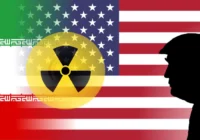To try to foresee the next four years with US President-Elect Donald Trump, we should remember what we learned during his first presidential term: It is a mistake to take him literally and mock him because he is not serious in his bravado. Better the other way: Take him seriously, but not literally. Trump’s advantage is that he is not guided by rigid ideological principles, in contrast to the bellicosity of both the “neocons” and the “woke,” but is open to pragmatic transactions — always, of course, if they satisfy his vanity or his business. Another advantage of his, paradoxically, is that there will be open results due to his incompetence and disorder.
Let us review the agenda. The number one problem in the world today, and Trump’s greatest threat, is the climate crisis, which is accelerating its destructive consequences. Trump will undoubtedly promote fossil production, but the Environmental Protection Agency will maintain the protective and preventive regulations established over the past few years, 12 states will continue to apply restrictions on emissions, and large cities will continue to spread renewable energy.
Regarding immigration, this time Trump did not insist on the wall (most of which he failed to build while he was last in the White House). In this campaign, he turned to “mass deportations,” which can mean common-sense controls to cross the border, as already agreed with the Mexican government regarding non-Mexicans, or an illusory hunt for individuals without proper documents in neighborhoods, workplaces and family homes, which would not only be savage but logistically unfeasible. In reality, it is to be hoped that Congress will reactivate the bipartisan agreement for immigrants’ legalization and access to citizenship that Trump ordered to be stopped not because of its content but because it would have been approved during the campaign and would have taken away his favorite topic for demagoguery.
As for Israel and Palestine, the biggest problem is that Trump is now prioritizing enmity with Iran, which finances and pushes Hamas and Hezbollah and whose agents tried to assassinate him twice (or perhaps thrice). He will have a hard time resurrecting the Abraham Accords that his Jewish son-in-law negotiated during his first term: exploring again the two-state solution in exchange for diplomatic recognition of Israel by Arab countries. Now, Saudi Arabia and the United Arab Emirates will only accept it if Trump diminishes his hostility against Iran, where a “reformist” candidate won the presidential election and seems to have appeased the fury.
Regarding Ukraine, Trump boasted that he would “fix it in 24 hours,” but was not very specific. Two days after the election, at the Valdai Forum, Russian President Vladimir Putin rushed to offer a peace agreement based on the “self-determination” of the people of Donbas in exchange for respecting Ukraine’s borders. Putin also hinted that Russia could restore natural gas supplies through the Baltic to Germany, which Ukrainian agents destroyed. A Trump adviser has outlined a plan to defend Ukraine’s neutrality outside NATO for the next twenty years. All this sounds similar to the Minsk Agreements reached a few years ago by Putin and Ukrainian President Volodymyr Zelenskyy with German Chancellor Angela Merkel and French President Emmanuel Macron, which US President Barack Obama ignored.
In the face of Trump’s disdain, the European Union may reinforce internal solidity and external autonomy. Many NATO members are already ceasing to be free-riders on the United States and are fulfilling their commitment to invest at least 2% of GDP in defense. Their number has risen from four to 23 in just six years.
The biggest alarm raised by Trump’s election is that the future of democracy and legal security in the United States may be in jeopardy. Will there be “revenge” against “internal enemies,” and will he go after politicians, judges, generals, officials, journalists and other opponents? He may not need to once the pending court cases are canceled and he has satisfied his obsession with returning to power. The Senate Republican group has already rejected Trump’s nominee to lead it, and the Senate can veto some of his announced appointees. It is worth remembering that in his first term, Trump appointed three Chiefs of Staff in four years and changed most members of the Cabinet, including State, Defense, Justice, Interior and Homeland Security, a tenor of personal instability that is likely to continue.
Some of Trump’s boasts may end in a major ridicule, such as ordering Elon Musk to cut a third of the budget. Incompetence could also sink him in the face of some unforeseen catastrophe, as happened to during US President George Bush’s second term with Hurricane Katrina and to himself with the COVID-19 pandemic. Will Trump be able to maintain a regular daily work schedule in his eighties, or will he, like Joe Biden, be busy only from 10 AM to 4 PM? It is not guaranteed that he will complete four years in good shape.
Ultimately, Trump could also become a chaotic parody of the befuddled White House visitor in the film Being There (1979). As Mister Chance says, “I can’t write. I can’t read. But I like to watch television.” Just like Donald the Returned.
[The author’s blog first published this piece.]
The views expressed in this article are the author’s own and do not necessarily reflect Fair Observer’s editorial policy.
Support Fair Observer
We rely on your support for our independence, diversity and quality.
For more than 10 years, Fair Observer has been free, fair and independent. No billionaire owns us, no advertisers control us. We are a reader-supported nonprofit. Unlike many other publications, we keep our content free for readers regardless of where they live or whether they can afford to pay. We have no paywalls and no ads.
In the post-truth era of fake news, echo chambers and filter bubbles, we publish a plurality of perspectives from around the world. Anyone can publish with us, but everyone goes through a rigorous editorial process. So, you get fact-checked, well-reasoned content instead of noise.
We publish 2,500+ voices from 90+ countries. We also conduct education and training programs
on subjects ranging from digital media and journalism to writing and critical thinking. This
doesn’t come cheap. Servers, editors, trainers and web developers cost
money.
Please consider supporting us on a regular basis as a recurring donor or a
sustaining member.
Will you support FO’s journalism?
We rely on your support for our independence, diversity and quality.










Comment